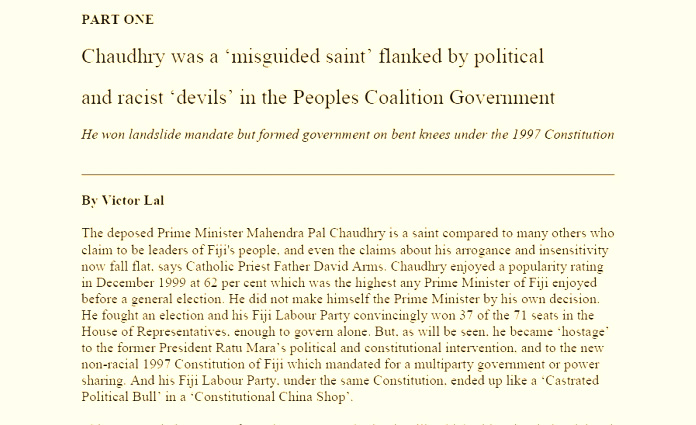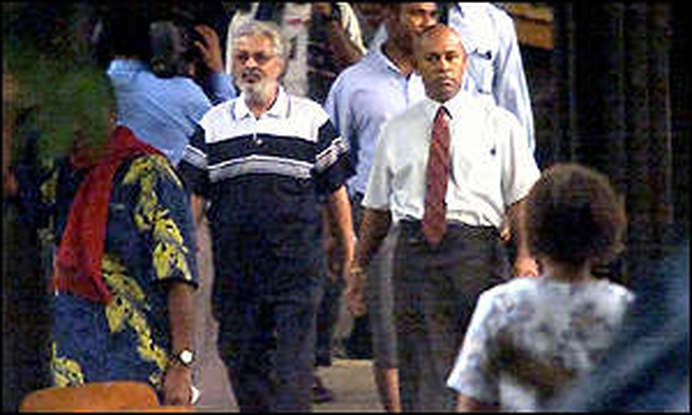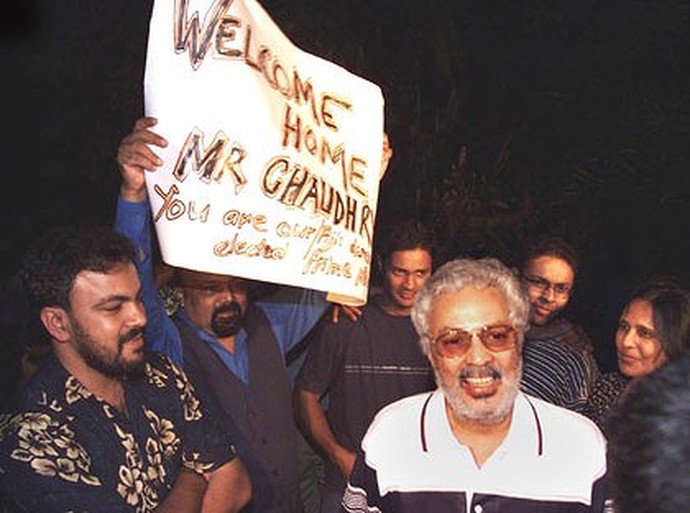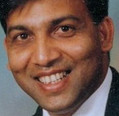
Fiji's Daily Post, 2001
PART FOUR
THE RACE TO BECOME PRIME MINISTER
A Tale of ‘Greedy Political Hares chasing after the Galloping Hound’ - Chaudhry fights his corner to become Prime Minister - refuses to play second class citizen in Fiji
One of the most distressing spectacles in the run up to the appointment of the new Prime Minister of Fiji was the introduction of the race card by the Fijian Association Party (FAP) and some elements from the Party of National Unity (PANU). Here were two parties in coalition with the FLP, and yet when it came to the big prize they began to demand that a Fijian should be appointed the Prime Minister of Fiji. They demanded the top post for a Fijian not on merit and electoral numbers but based on the crude politics of race and fear. What is more surprising, is that it was Adi Kuini’s FAP, which was the most vocal in pushing for a Fijian prime minister on the spurious argument that it represented the Fijian electorate in Parliament.
It was a surprising demand on her part because Adi Kuni should have known better than any other Fijian politician, based on her own personal experiences of the 1987 coups, that her own late and former husband, Dr Timoci Bavadra, had been overthrown from power despite being a Fijian, and was married to a paramount Fijian high chief. Adi Kuini hails from the chiefly clan of Navosa and is also a niece of the great Fijian leader Ratu Sir Lala Sukuna.
The race for the prime ministership was like a tale of running with the hare and hunting the hound. But Chaudhry, the wily old political fox, had outfoxed the political bears. Labour’s overwhelming victory had put Chaudhry at the political helm. Once the official election results were announced, the Labour Parliamentary caucus elected him as the party’s nominee for prime minister. Soon afterwards, he was appointed Prime Minister by the President Ratu Sir Kamisese Mara.
Chaudhry fights corner to be PM
The Fijian Coalition partners claimed that they were neither consulted nor informed, and reacted angrily claiming Chaudhry’s appointment a breach of an implicit agreement to have an ethnic Fijian as prime minister. The FAP had decided that they would only join the FLP if party leader Adi Kuini was made Prime Minister. They said they would not join unless their stipulation was met. Viliame Saulekaleka said instead of waiting to discuss the issue with them, they were shocked that the FLP had gone ahead in getting Chaudhry sworn-in. It was believed that PANU was also considering opting out of the coalition. PANU would have wanted their leader Apisai Tora to be PM had he won his seat.
But Chaudhry was forthright in his desire to become PM: ‘It is the Labour Party which has the majority in this election and that’s what democracy is all about, and the people have given their mandate, and that mandate must be respected’, he said. Chaudhry was the obvious party choice for the position, although there were other contenders, including Tupeni Baba. Chaudhry also had the tacit support of his political adversary, the defeated NFP leader Jai Ram Reddy, who told the press: ‘One thing is very clear-the people’s mandate must be carried forward. And the people have overwhelmingly voted for the Fiji Labour Party. And the leader of the Fiji Labour Party, I think, is entitled to being the Prime Minister. And I sympathise with that point of view so that’s the correct thing to do. And their support is not marginal, its quite overwhelming. And as he (Chaudhry) put it, I think, the verdict of the people is crystal clear. So I’m hoping that he will be the Prime Minister.’
Chaudhry was sworn-in as the new and first Indo-Fijian Prime Minister of Fiji. The swearing-in ceremony was delayed because officials had to look for the Hindu holy book, the Gita. This small but significant piece of religious item of historical importance, just goes to show that the Government House had never been prepared for such an eventuality, for it was the Bible that had been used since the first elections in post-independence Fiji to swore-in prime ministers of Fijian origin. One noticeable absentee at the swearing-in-ceremony was Adi Kuini Vuikaba Speed. Her non-attendance, for whatever reason, was later to be taken as a snub and a detrimental move for her party by the FLP.
Adi Kuini asked President Ratu Mara to revoke the decision and appoint her as head of government because she was the leader of the largest ‘Fijian’ party in the winning coalition. Poseci Bune, the VLV leader, reportedly began canvassing the possibility of heading a broad coalition of Fijian parties in opposition. Tora threatened to pull out of the coalition altogether. The Fijian nationalists proposed to march against the government. Ratu Mara however rejected a request from the FAP to install their leader, Adi Kuini as the new PM. The letter was delivered to Ratu Mara by FAP official and Bau chief, Ratu Viliame Dreunimisimisi. Mara rejected the letter, saying he had already installed Chaudhry as the leader of the Coalition, and asked them to work with the Coalition. Mara did Chaudhry no favour: he did what the Constitution required him to do as President of Fiji: to appoint as prime minister the member of the House of Representatives who in his opinion commanded majority support.
In turn, Chaudhry offered Adi Kuini the post of Deputy Prime Minister. He had outmanoeuvred her. She had two choices: to accept the second top post in the government or sit on the Opposition benches with her former opponents from the SVT. Labour also threatened to invite VLV into Cabinet. After hours of deliberations with party colleagues, Adi Kuni accepted the second deputy prime minister position in the new Cabinet. She quoted Mara’s advice: ‘It was basically appealing to us as leaders to consider the importance of co-operation rather than be at loggerheads with the new government.’ But coalition partner, PANU, expressed its disappointment with Chaudhry’s invitation to the VLP. PANU officials said they did not appreciate the fact that Chaudhry asked another party before even approaching them, their coalition partner.
PANU however also accepted Chaudhry’s offer to join the government. Its parliamentary leader-Meli Bogileka-said they had accepted Chaudhry’s offer of two Cabinet seats to them: ‘The Prime Minister has offered us two ministeries positions. And I would like to thank Prime Minister for that being so generous because PANU-if you look at our constitution-there are only four elected members of parliament there. We are not entitled as far as the constitution is concerned. We’re supposed to have the number eight as you well know. So he has given us in realisation of PANU coming from the province of Ba-where more than 60 per cent of ALTA is based-the concentration of the population of our brother and sister Indians- who are mainly cane farmers-and that’s where the economy of the country lies-in the western division.’
Tora seems to have belatedly given his blessing. ‘He said your decision is totally yours and he has given us his blessings. He says whatever your decisions are-those are your decisions-and I leave it at that. I don’t like to intervene or interfere and he said so you have my blessings’, Bogileka said. Chaudhry also extended an invitation to the VLP and SVT to join Labour in forming government. ‘I hope they respond soon. Labour has the numbers to form government on its own but I would like them very much to join us so that we can have a government representative of all the people in Fiji. I have a duty to provide a stable government as soon as possible.’ Chaudhry was confident that the two parties would take up the offer: ‘There is not much difference between us except for (Sakeasi) Butadroka.’ On calls by some VLV members for Fiji to be made a Christian state and for a re-imposition of the Sunday ban, Chaudhry said VLP leader Bune had made it clear that there will be no Sunday ban and neither will Fiji be declared a Christian state. Chaudhry also invited the two Independent General MPs (Leo Smith and Bill Aull) and the lone Rotuman MP Marieta Rigamoto to be part of his Coalition.
Chaudhry was suddenly under a siege situation as minority parties made impossible demands for places in his new Cabinet. In fact, Chaudhry had to delay naming his Cabinet because of demands made on him, especially from the SVT which was soundly thrashed at the polls. STV leader Rabuka wrote to Chaudhry saying his minority group will join a multi-party Cabinet if it is given four Cabinet portfolios, including the position of the Deputy Prime Minister for himself, the Ministry of Works portfolio for Ratu Inoke Kubuabola, and Ministry of Finance portfolio for Jim Ah Koy. Rabuka also demanded seats in the Senate and in the boards of state-owned enterprises.
The results of the general election had given Chaudhry such an overwhelming majority to lead the country in the 21st century. But the Constitution had required of him to make an offer to the SVT. It was possible, some argued, that some of the demands being made, especially from the SVT, were being designed to put Chaudhry in a situation where he was damned if he said ‘yes’, and damned if he said ‘no’. What is surprising is that the SVT caucus, according to Rabuka’s biographer John Sharpham, had agreed shortly after the election results were announced, to remain on the Opposition benches, and not be a part of the multi-party government.
Rabuka later claimed that, ‘We had accepted the Prime Minister’s invitation to be part of the multi-party Cabinet on the condition that I become the Deputy Prime Minister. Our collective decision was that because we structured the new Constitution, we should join the multi-party Cabinet of Chaudhry’s government. Our collective decision is that because we were party to the Constitution, we structured the Constitution in our belief that it was good for the country, good for us to have a multi-party Cabinet and to uphold those we decided to be part of the new Government’
The terms put forward to Chaudhry included that Rabuka be also made the Minister for Fijian Affairs. As we have already noted, Chaudhry found these demands unacceptable, specially from a party which was not only soundly thrashed at the polls, emerging with only eight seats, but the fact that it was not even part of the Peoples Coalition in the first instance. ‘I invited them and they wanted to dictate to me their terms which I just can not entertain’. While Chaudhry seemed like he was under a lot of pressure, political observers insisted he was in too strong a position to be bullied. Unfortunately, while Chaudhry refused to be bullied, he however, bent over backwards to appease the Fijian community at large, and in the process drawing the wrath of his own community in the appointment of his Cabinet. He had to appeal to his Indo-Fijian members of his Government to accept his desire to share power with Fiji’s other communities.
Fijians dominate Chaudhry Cabinet
Chaudhry picked a Fijian dominated Cabinet as he moved to bring the two major races together. He had made a great political sacrifice after 11 Fijians were sworn into the 17-member Cabinet. Many thought the Cabinet was going to be dominated by Indo-Fijians. There was widespread rumours that Ratu Mara had a hand in shaping his Cabinet. ‘I must admit that His Excellency played a very major role in the naming of my Cabinet and he did it in his usual way’, Chaudhry said. Asked why his cabinet weighed heavily in favour of Fijians, Chaudhry said: ‘Why not?’. Chaudhry’s strategic move was seen by political observers as sensitive to the sensitiveness of the Fijians. He was trying to fulfil the multi-racial, multicultural and multi-party spirit of the 1997 Constitution of Fiji.
Chaudhry left the post of the crucial Ministry of Home Affairs vacant until further consultation with his FLP partners. He however intimated that the post will go to a FAP MP and not to the VLP as speculated. It was rumoured that the post would go to the defeated VLP candidate and one of its founders, Ratu Epeli Ganilau. While Chaudhry seemed to have won the first round of the battle, Rabuka resigned from his embattled leadership of the SVT, and went on to become the chairman of the Great Council of Chiefs. Chaudhry allocated Adi Kuini the powerful but sensitive Fijian Affairs portfolio which made her chairperson of the Great Council of Chiefs, from where she was expelled by the Rabuka Government because of her leadership of the FAP. From hindsight, it was a strategic mistake, for now Adi Kuini suddenly found herself having to deal with Rabuka as the leader of the powerful body when she and her party expected a senior Fijian chief to fill the revered role.
Moreover, Rabuka had wanted her Fijian Affairs post as part of the condition to enter Chaudhry’s government.
As he exited from the political scene, Rabuka again blamed the Indo-Fijians for rejecting his party’s philosophy of multi-racialism. There was no call to the indigenous Fijians to shed their own insular and inward looking nationalism, and to reciprocate by accepting the Peoples Coalition’s version of multi-racialism. We have already pointed out elsewhere why the charges against the Indo-Fijians are false. What had caused SVT’s defeat, according to Rabuka, was ‘the personal weaknesses of the candidates, the personal weaknesses of those that were sitting in the last [Rabuka] government, failing to visit their Constituency regularly, the unpopularity of some of the Government policies, the weaknesses in our party machinery and structure’, and of course, ‘my coalition with the National Federation Party (NFP) was one of the causes of the SVT downfall’. It was not THE cause of SVT’s downfall.
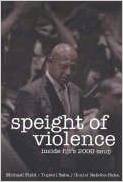
Was Dr Baba betrayed for PM’s job in 1999?
Did his Indo-Fijian colleagues put a political knife in his back?
By VICTOR LAL
The Fiji Sun, March 2006:
Dr TUPENI BABA has suddenly popped up in Fiji on the eve of the general election. He has been allocated a seat by the SDL to fight the election, even though he was not listed on the primary list of candidates. And expectedly he has begun to make political noises, especially against his former political boss Mahendra Pal Chaudhry of the Fiji Labour Party. Baba has been explaining and unconvincingly defending his decision to join the SDL. He is however palpably silent on his other creature – the New Labour Unity Party.
What is going on? Why is Baba taking a public swipe at Chaudhry. He says that the FLP does not deserve to lead Fiji unless it changes its leader Chaudhry. Baba says that his former boss is a shadow of his former political self. If the SDL hopes that his inclusion will strengthen their winning team, they are mistaken. The reverse is quite possible. The more he speaks out the less he will be listened to. After all, he has been out of politics for the last five years. According to Baba, Chaudhry's judgement was affected by the events of the 2000 coup and as a result, he had been pursuing politics of negativity for the last five years.
Is Baba’s own alleged treatment in 1999 clouding his political views. What is the truth? Truth, that much abused word in Fiji. Was Baba denied the Prime Ministership by Chaudhry and his Indo-Fijian collegaues as Baba claimes in his book the Speight of Violence. Is he trying to settle old political scores? I am sure that sooner or later Baba will revert to that fateful day in 1999 when the race for the Prime Ministership began following the Peoples Coalition’s stunning victory. Lets travel down that memory lane, to the year 1999. (Edited out, for details, see above posting)
In his published book, Speight of Violence: Inside Fiji’s 2000 coup, co-authored by journalist Michael Fields, Baba claims that he was led to believe that he would be prime minister. He also alleges that Tora’s fury stemmed from the fact that FLP, by fielding strong candidates, especially in Tora’s Nadi Open, had reneged on its promise to put up only token candidates. Tora lost his seat in the election, and FLP’s Parduman Raniga won. According to Baba, ‘This led to acrimonious debates and accusations but Chaudhry was insistent he did not agree to this principle in the first place’.
It was also expected that Adi Kuini would be a contender for the post of prime minister. During the election campaign, however, Baba claims that his name was touted around for the job. In Fijian constituencies, ‘People asked about leadership. Again and again I was asked who would be prime minister if we won. I avoided answering but the senior members of the party who were with me told the people that a Fijian would be prime minister and then my name was mentioned’. At a rally at Lautoka, even Chaudhry who had been with Baba as he spoke to the crowd, announced that they had just heard the address of their future prime minister (Baba). Baba claims that as they moved into traditional Fijian areas that their expectation was that he would be leading Labour and its coalition as prime minister. ‘There was nothing I had encountered in the discussions at various levels that was not consistent with this expectation. As we campaigned with the most senior Indo-Fijian Labour leaders like Krishna Datt and Pratap Chand, both members of the Labour Party management board pushed the same message, especially in their constituencies’.
Baba denied PM’s job?
On Tuesday 18 May 1999, according to Baba, he received a word of a meeting of the management board in the Public Service Room at 4pm. Party president Jokapeci Koroi, Pratap Chand, Krishna Datt, Sachida Sharma, whose son was married to Chaudhry’s daughter, and Baba, attended the meeting. After the opening prayer and pleasantries, they discussed the leadership of the party. Koroi, Baba claims, expressed surprise and asked Chaudhry to explain his change of view as to who was to lead. It was obvious she had heard that he wanted to be prime minister, which at that point Baba claims he had not heard. Chaudhry explained that in terms of the tradition of democracy, the parliamentary leader who led the party into election was normally expected to be the prime minister if the party won. He went on to say that if ‘we did not give him the post of premiership it would be tantamount to giving him a vote of no confidence’. He continued that already people were calling him prime minister.
According to Baba, ‘Koroi turned to other members, especially Pratap Chand and Datt. I sat there composed and interested in the viewpoints of my other close colleagues. These were people with whom, and in whose defence, I had faced imprisonment, abuse and persecution from my own Fijian people in 1987-including having a close Fijian relation, Rabuka, pointing a gun at my head because of my belief in a united Fiji through multiracialism, democracy and social justice, the central tenets of the Labour Party’.
Up to this day, Baba claims, he cannot recall anything of any significance in their contributions to that discussion. Here were the people in the Indian community ‘I had respected and shared many moments of joy with: I had known their families and relations. Both had publicly stated who should lead if Labour wins. I could not believe they could be too tongue-tied or scared to express their views, unless they felt intimidated by Chaudhry. They had a record in Fiji of being articulate and forceful speakers but they remained quiet. I could not expect anything different from Sachida Sharma; I knew he would ‘echo his master’s voice’ Now that Baba heard their views, he said, ‘I’m ready to lead if you want me’. He explained what they had promised to the people and what the people expected of them. They sat for two hours, Baba claims; later they heard that the members of the Labour Party caucus who had been waiting for the result were beginning to suspect we had disagreed on the leadership. A number of alternatives came to mind. Baba claims that he knew that if they were to vote on the issue, it would be the Fijians (Koroi and him) against the Indo-Fijians, but he thought that for such an important issue, voting was hardly appropriate. Other ideas came to him – his mind was furiously turning as he talked. Continued Baba: ‘Should I resign or should I walk out and express my disgust publicly? But this would break up the party. I recalled the faces of the people in Bua and Dama and the hundreds of villages and settlements I visited during the campaigns telling me with one voice: stay. I could hear their requests for electricity, for better medical facilities, for better schools, for running water, for better transport in the small and remote islands and for Fijians, Indians, Islanders and other races.’
Baba had made his point. Now the party members of the management board had to accept the responsibility of their decision. They offered Baba the post of deputy prime minister and Krishna Datt, Baba claims, suggested switching the post of prime minister in one year; it was all to ‘appease their own conscience; they were searching for something they could say to the Fijian people’. Baba remained detached from the rest of the discussion, as he ‘had lost respect for some of my close associates-in my estimate, they had already destroyed their own credibility’. He wondered ‘how they could serve the party henceforth’. As the management board meeting was about to end Baba was asked to move a motion in the Labour caucus that Chaudhry be made prime minister, to be seconded by one of his colleagues. What a suggestion, Baba thought – ‘it showed an ignorance of Fijian protocol’. According to Baba, ‘Koroi, an indigenous Fijian and president of the party looked at me and I could read her mind. She too was in turmoil. She would have to deal with her own struggle. Despite my long years as a professional educator and academic, I was a Fijian grounded in Fijian deep sense of veirokorokovi or respectfulness based on our honest dealings with each other. This had been breached-and no wonder; there had been no genuine cooperation between the two major racial groups in politics, certainly not in practice in the Labour Party at that point’.
Baba went on to conclude, “As I moved the motion, I knew from the faces of the seven Fijians out of the 37 elected members present that we had a hard job ahead of us. Joeli Kalou, the most senior of them, looked me in the eye and he did not have to express it. Given the disposition of Chaudhry, both Kalou and I knew that the job would be next to impossible. The pleasantries that followed that caucus meeting soon faded into insignificance for many of my Fijian colleagues. As the news broke out, our phone lines became clogged and we started to explain (and even justify) how the spirit of the Fiji Labour Party had died. Chaudhry was not to be denied, though, and insisted on taking the leadership. The Government was sworn in on 19 May 1999. He proudly said of it: ‘I have to put the constitution to test’.”
Baba’s wife, Unaisi Nabobo-Baba has added her recollections to the controversial episode: ‘On the campaign trail typical Labour promises were made…Among the promises was one that Tupeni would be prime minister. Tupeni could not have been prime minister, however, for a number of reasons. Firstly, in the morning after the victory announcement, before the world was awake, I received a telephone call from Chaudhry’s house asking Tupeni to attend the swearing-in of Mahendra Chaudhry as PM. Tupeni was requested to bring along the other two attendants requested by Mahen: Jokapeci Koroi and Joeli Kalou. Kalou declined, giving reasons that this was not the promise made to the people during the campaign. Koroi as party president and Tupeni attended, not before Tupeni got an earful from me about the fact that the other two Fijian parties in the new coalition had not been summoned for a joint meeting over the choice of premiership. By eight o’clock that morning, Tupeni and Koroi entered the Government House for the swearing-in. It was not to be, however. Tupeni returned saying the president was not ready and could they kindly return at 11 o’clock when his office staff were ready for duty.’
Unaisi Baba prayed, hoping that Baba’s returning home was not a bad omen, a sign that life needed to be closely guarded. But again, she notes, ‘it could have been that I was just smelling a rat; one never is sure in politics about the political goings-on, hey confuse more than anything, and some politicians clearly have more mastery over such an art than others. She went on to claim: ‘Chaudhry decided that the official residence where Rabuka had lived for five years was too small and constricted compared to his own house. He suggested that the official residence be given to the vice-president, Ratu Jofesa Iloilo. This was reported in the press and drew criticism not only from Rabuka but also from other Fijians. It implied that he was passing the house to the vice-president, a high chief, because it was not good for him.’ In the same book, Baba went on to point out other alleged shortcomings of Chaudhry, including the way ‘Chaudhry went around standard public service procedure and hired his son Rajendra as personal secretary. It looked like nepotism’.
Responding to Baba’s book, the FLP said it was not surprised that a frustrated Baba should discredit its leader Chaudhry. According to the FLP, ‘Baba is a frustrated, embittered person who had always harboured ambitions of taking over leadership of the Labour Party but never had grassroots support to make a successful bid. He ran away from Fiji after the humiliation of his 2001 defeat. FLP categorically rejects the claims that Chaudhry had seized the leadership of the FLP to become prime minister in 1999 despite giving assurances that Baba would get the post of prime minister, should Labour win the elections. The question of seizing leadership does not arise as Chaudhry had been the official and recognised leader of the Fiji Labour Party. Chaudhry has always held the opinion, backed by political convention, that the person who successfully leads the party into elections, takes over as prime minister regardless of his ethnicity’. Chaudhry added: ‘I have never subscribed to the view that only an indigenous Fijian is eligible to be prime minister of Fiji. Why would I then give such an assurance to Baba?’
When Baba challenged Chaudhry for the FLP’s leadership in 2000, I wrote an article calling Baba ‘The Great Pretender’ and went on to urge him to allow his vision of multi-racialism to triumph over the politics of race. We had just emerged from the political terrorism of George Speight’s coup. But now, as we prepare for the next election, it is important for Datt, Chand, and Koroi to explain their version of events. For only lately, Chaudhry called upon Datt, one of the founding fathers of the FLP, to stay on to guide the party in the next elections.
Was Dr Tupeni Baba betrayed in 1999? Or has he told a spate of untruths about the race to prime ministership. The onus is on the FLP to tell us their version of truth.
In Fiji, history has a habit of repeating himself. TOMORROW: In 1977, Siddiq Koya was betrayed, says Chaudhry


